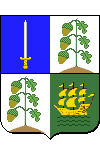Jean-Guillaume de Winter
Count of Huessen and count of the Empire
Pronunciation:

Jean-Guillaume de Winter was born on March 23, 1761 in Kampen, a small town in the United Provinces (now the Kingdom of the Netherlands).
He joined the navy at the age of twelve, and was a lieutenant when he took part in the revolutionary movement to overthrow the Stathouder's government. The failure of this revolution, following the armed intervention of England and Prussia in 1787, led to the exodus of many Batavian patriots. De Winter was one of them. He took refuge in France, where he joined the army.
He became a general during the Revolution, and returned to his homeland in 1795 with Jean-Charles Pichegru's army. On January 21 of that year, he commanded the French cavalry detachment that seized the Dutch Helder fleet, paralyzed by ice. His compatriots appointed him vice-admiral and commander of the Dutch Texel fleet.
On 11 October 1797, he fought the English fleet at the battle of Camperdown (a corruption of Camperduin), which ended in his defeat and captivity . After his release, obtained in December through an exchange of prisoners, his conduct during the battle was examined by a council of war and unanimously approved.
He was then appointed Minister Plenipotentiary of the Batave Republic to the French government, a position he held between July 1798 and 1802, after which he was recalled to Holland to take charge of the naval forces there. His main campaign took him to the Mediterranean to flush out and destroy the Barbary pirates who were hampering Dutch trade. The campaign ended in a treaty.
In 1809, Louis Bonaparte, now King of Holland, made him Marshal and Commander-in-Chief of his land and sea troops. On May 4, 1810, he created him Count of Huessen.
Following the annexation of the kingdom by the Empire (July 1810), Napoleon I placed his trust in Jean-Guillaume de Winter. He appointed him Grand Officer of the Legion of Honor, Vice-Admiral on December 12, 1810, Inspector General of the North Sea coasts on March 23, 1811, 1811 Count of the Empire on May 9 and finally, in July, Commander-in-Chief of the naval forces concentrated at Texel (a commune in northern Holland).
In 1812, Winter fell ill and had to hand over command to his compatriot, Admiral Charles-Henri Verhuell. He died shortly afterwards, on June 2, in Paris, and was buried in the . His heart is preserved in his native city.
"Admiral Jean-Guillaume de Winter". Nineteenth century engraving.

As the Admiral was without means, the Emperor ordered the State to pay for his funeral, which was solemnized.